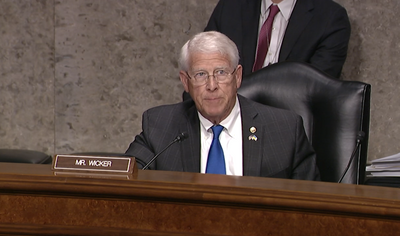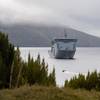Wicker Probes US Navy Shipbuilding Needs In Committee Hearing
U.S. Senator Roger Wicker, R-Miss., a member of the Senate Armed Services Committee participated in a Senate Armed Services Committee yesterday to consider pending nominations for the Department of Defense.
At the hearing, Wicker discussed the importance of growing the capability and capacity of the U.S. Navy’s fleet with Erik Raven, nominee for Under Secretary of the Navy, and William LaPlante, nominee for Under Secretary of Defense for Acquisition and Sustainment.
In one exchange, Raven affirmed to Wicker the importance of stability for the defense industrial base.
“The 30 year shipbuilding plan…is the signal to industry of what to expect for future years, so industry can prepare to build those ships in the most effective manner possible,” Raven said to Wicker. “And let me also add that the authorities provided by this committee to make sure that industry can operate efficiently in building those ships is a very critical tool.”
In another exchange, Raven responded to a question from Wicker about the $625 million Congress appropriated for shipyard optimization and improvements. Raven said it “is a once in a century bill that needs to be addressed,” and that shipyards are “key to generating readiness.”
“Senator, [shipyard] facilities are key to generating readiness,” Raven added. “There's been much discussion about the shipyards, and I agree that this is a once in a century bill that needs to be addressed.”
In questions to LaPlante, Wicker received assurances that the nominee would work collaboratively with the Navy and Marine Corps to determine force requirements rather than allowing those numbers to come from the Office of the Secretary of Defense or the Office of Management and Budget. LaPlante made clear he believes the Navy needs a larger fleet size.
“Obviously, we need more numbers, as has been said many times. Quantity has a quality all its own,” LaPlante said of the Navy’s force structure.
LaPlante also told Wicker that enhancing readiness will require significant funding.
“As we know, as we see in Ukraine, sustainment and readiness of the force is top, has to be a top priority,” LaPlante said to Wicker. “And we have to fund these areas. That's going to continue to give ready force for years to come.”











